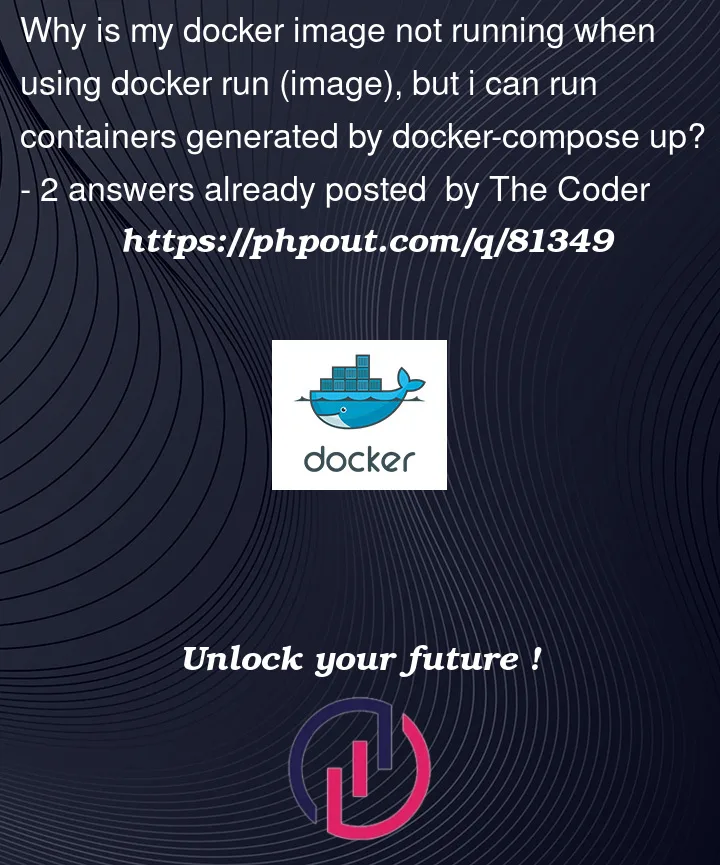My docker-compose creates 3 containers – django, celery and rabbitmq. When i run the following commands -> docker-compose build and docker-compose up, the containers run successfully.
However I am having issues with deploying the image. The image generated has an image ID of 24d7638e2aff. For whatever reason however, if I just run the command below, nothing happens with an exit 0. Both the django and celery applications have the same image id.
docker run 24d7638e2aff
This is not good, as I am unable to deploy this image on kubernetes. My only thought is that the dockerfile has been configured wrongly, but i cannot figure out what is the cause
docker-compose.yaml
version: "3.9"
services:
django:
container_name: testapp_django
build:
context: .
args:
build_env: production
ports:
- "8000:8000"
command: >
sh -c "python manage.py migrate &&
python manage.py runserver 0.0.0.0:8000"
volumes:
- .:/code
links:
- rabbitmq
- celery
rabbitmq:
container_name: testapp_rabbitmq
restart: always
image: rabbitmq:3.10-management
ports:
- "5672:5672" # specifies port of queue
- "15672:15672" # specifies port of management plugin
celery:
container_name: testapp_celery
restart: always
build:
context: .
args:
build_env: production
command: celery -A testapp worker -l INFO -c 4
depends_on:
- rabbitmq
Dockerfile
ARG PYTHON_VERSION=3.9-slim-buster
# define an alias for the specfic python version used in this file.
FROM python:${PYTHON_VERSION} as python
# Python build stage
FROM python as python-build-stage
ARG build_env
# Install apt packages
RUN apt-get update && apt-get install --no-install-recommends -y
# dependencies for building Python packages
build-essential
# psycopg2 dependencies
libpq-dev
# Requirements are installed here to ensure they will be cached.
COPY ./requirements .
# Create Python Dependency and Sub-Dependency Wheels.
RUN pip wheel --wheel-dir /usr/src/app/wheels
-r ${build_env}.txt
# Python 'run' stage
FROM python as python-run-stage
ARG build_env
ARG APP_HOME=/app
ENV PYTHONUNBUFFERED 1
ENV PYTHONDONTWRITEBYTECODE 1
ENV BUILD_ENV ${build_env}
WORKDIR ${APP_HOME}
RUN addgroup --system appuser
&& adduser --system --ingroup appuser appuser
# Install required system dependencies
RUN apt-get update && apt-get install --no-install-recommends -y
# psycopg2 dependencies
libpq-dev
# Translations dependencies
gettext
# git for GitPython commands
git-all
# cleaning up unused files
&& apt-get purge -y --auto-remove -o APT::AutoRemove::RecommendsImportant=false
&& rm -rf /var/lib/apt/lists/*
# All absolute dir copies ignore workdir instruction. All relative dir copies are wrt to the workdir instruction
# copy python dependency wheels from python-build-stage
COPY --from=python-build-stage /usr/src/app/wheels /wheels/
# use wheels to install python dependencies
RUN pip install --no-cache-dir --no-index --find-links=/wheels/ /wheels/*
&& rm -rf /wheels/
COPY --chown=appuser:appuser ./docker_scripts/entrypoint /entrypoint
RUN sed -i 's/r$//g' /entrypoint
RUN chmod +x /entrypoint
# copy application code to WORKDIR
COPY --chown=appuser:appuser . ${APP_HOME}
# make appuser owner of the WORKDIR directory as well.
RUN chown appuser:appuser ${APP_HOME}
USER appuser
EXPOSE 8000
ENTRYPOINT ["/entrypoint"]
entrypoint
#!/bin/bash
set -o errexit
set -o pipefail
set -o nounset
exec "$@"
How do I build images of these containers so that I can deploy them to k8s?





2
Answers
I think that is because the commands to run the django server are in the
docker-compose.yml.You should move these commands inside the entrypoint.
Pay attention that this command
python manage.py runserver 0.0.0.0:8000will start the application with a development server that cannot be used for production purposes.You should look for gunicorn or similar.
The Compose
command:overrides the DockerfileCMD.docker rundoesn’t look at thedocker-compose.ymlfile at all, anddocker runwith no particular command runs the image’sCMD. You haven’t declared anything for that, which is why the container exits immediately.Leave the entrypoint script unchanged (or even delete it entirely, since it doesn’t really do anything). Add a
CMDline to the DockerfileNow plain
docker runas you’ve shown it will attempt to start the Django server. For the Celery container, you can still pass a command overrideIf you do deploy to Kubernetes, and you keep the entrypoint script, then you need to use
args:in your pod spec to provide the alternate command, notcommand:.